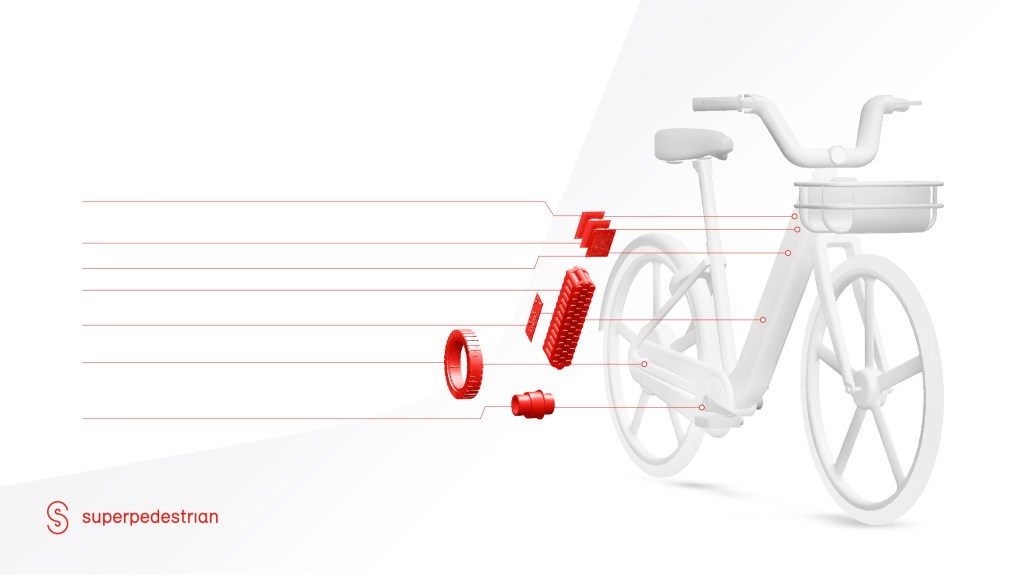Superpedestrian, a Cambridge, Ma.-based company, has been known until now for its electric Copenhagen wheel, which a user attaches to his or her bikes and operates through an app. It’s essentially a circular unit that houses a motor, a battery and sensors and is placed in the middle of the rear wheel, measuring how fast and how forcefully someone is riding and adding a little electric oomph when a bike’s pedals are pushed.
Riders love the wheel, but now, Superpedestrian is shifting gears. It isn’t abandoning its consumer base. Instead, it’s taking the wraps off an entirely new second business that plans to use the one million kilometers of data it has amassed from Copenhagen customers to improve the offerings of urban mobility companies. More specifically, it wants to sell them hardware and software that will keep their fleets up to snuff.
It doesn’t matter if these companies are renting out electric bikes, scooter, mopeds or all three. Superpedestrian is “micro vehicle” agnostic, suggests its founder, Assaf Biderman — who’d earlier spent 10 years working at MIT’s Senseable City Lab. In fact, he says Superpedestrian has been quietly modeling out this business-to-business diagnostics business since nearly the company’s launch five years ago but was waiting for small motorized vehicles to gain momentum.
Now, of course, scooter and e-bike sharing services are suddenly booming. Enter Superpedestrian, which says it’s time for the companies that are peppering city streets with their vehicles to improve their quality, and that Superpedestrian can help make them more reliable, easier to track, and more cost-effective over time.
Biderman is, alas, a little vague on some of the specifics. For competitive reasons, he declines to discuss how much Superpedestrian will charge for its technology or precisely how a customer like an Uber or a Spin or a Scoot would incorporate its tech into their products. He also won’t say whether Superpedestrian is already selling to any of these, or other, mobility companies already.
He is comfortable talking broadly about the sensors, embedded controllers, and software that Superpedestrian has created and protected thanks to the “dozens of patents” that the company has secured over the years, “from Japan to China to Europe to the U.S.” He suggests that what Superpedestrian has built in some ways mirrors the smarts in self-driving cars.
When a car opens in front of a rider, for example, that person’s natural inclination might be to slam on the brakes, but Biderman argues they aren’t always able to do this on pedal-assist bikes, which are actuated by sensing rider pedaling but have “very limited ability when it comes to sensing what the rider is actually doing with his or her feet.” Delays in power output due to controls, or gear lag, can also prove dangerous if the expectation is that a bike will push in synch with how the pedals are pushed. Superdestrian’s tech gives riders more control over the bike because it ensures the power is better synchronized with pedaling motions, he says.
The technology doesn’t just protect riders. Bideman says companies that work with Superpedestrian can also better protect their products. For one thing, he says, its technology can ensure their batteries don’t overheat. (As we’ve seen with autonomous cars, laptops and mobile phones, lithium-ion batteries can, on rare occasion, catch fire and explode.)
Investors certainly like Superpedestrian’s new direction. The company, which employs roughly 50 people, just closed on $16.5 million in Series B1 funding expressly to introduce its products and services into the e-bike and electric scooter sharing market. Designer Tony Fadell, investing from his investment and advisory firm Future Shape, participated in the round. So did Spark Capital, General Catalyst, and Charles Kim of Extol Capital, who also serves as managing director at China Renaissance in the U.S.
The new round brings the company’s total funding to $44 million. Biderman sounds highly motivated to put it to work, too.
“It’s great that micro mobility is becoming a reality in cities,” he says. He’d become obsessed long ago with how to squeeze more capacity out of roads, and nothing makes him happier than “one-person vehicles, because they’re occupied at 100 percent,” unlike cars that are “usually 60 to 80 percent unoccupied” and the “wrong scale as cities become more congested.”
Still, he continues, these new vehicles “need to have a different brain in them.” If he has his way, Superpedestrian will design it.































Comment